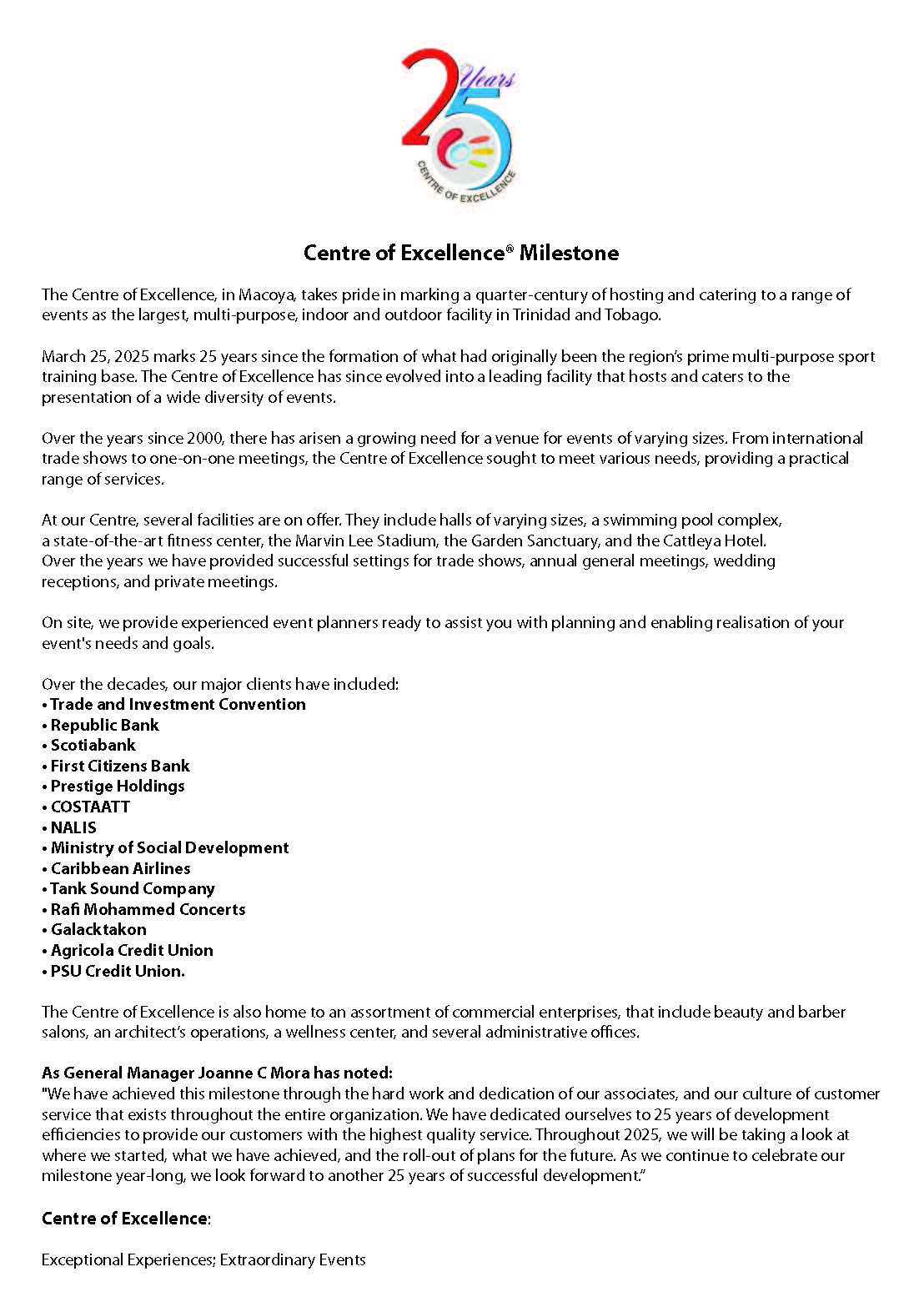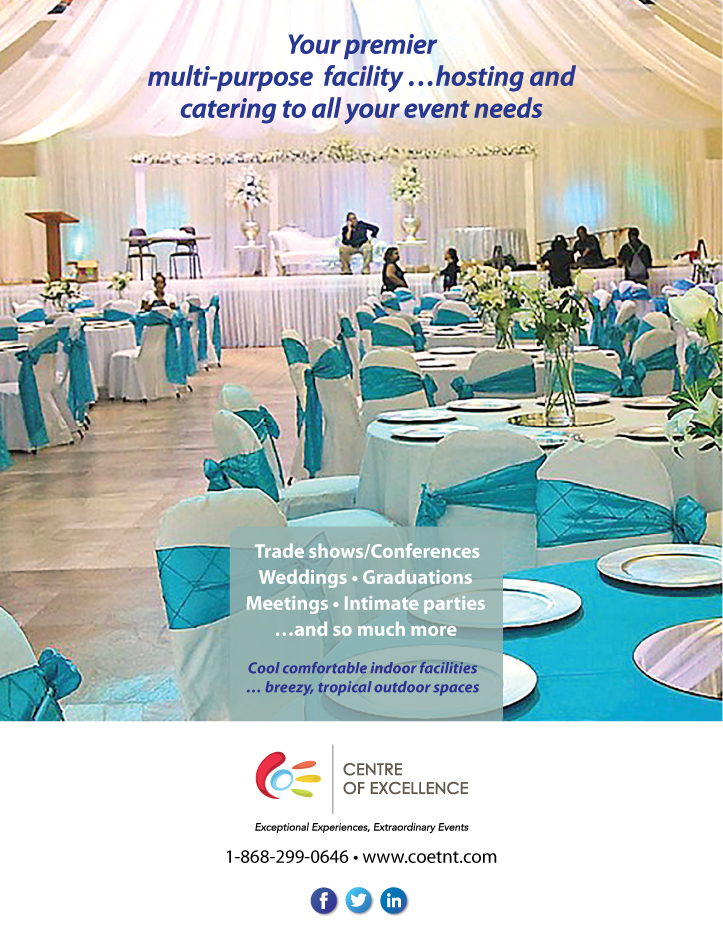25th Anniversary Centre of Excellence
Virtual meetings popular, but event spaces surviving
| Owner of Chancellor Hotel, Rajiv Shandilya |
Marketing and communications manager at the Centre of Excellence in Macoya, Michelle Borde-Harvey | CEO, T&T Coalition of Services Industries, Vashti G Guyadeen |
 |
 |
 |
While there has been a shift to businesses utilising webinars and other online methods to host and do business, the management of several conference and event centres in T&T believe that traditional brick-and-mortar meeting places will continue to remain relevant.
In July 2022, prominent US magazine Rolling Stone published an article with the headline, “Webinars: the Future of Online Business” in which it stated that businesses can reach even wider audiences through online platforms instead of the old fashioned physical meeting places.
Rolling Stone defined a “webinar” as an online seminar or an event that individuals can attend via video or audio conference call. These events are usually recorded so people who could not participate live can watch them at their convenience.
Marketing and communications manager of the Centre of Excellence and Cattleya Hotel, Michelle Borde-Harvey, in an interview with the Business Guardian, admitted that business “suffered” during the COVID-19 pandemic.
She described the Centre of Excellence as home to the largest indoor/outdoor multi-purpose event facility in T&T, featuring multiple event spaces, a swimming pool complex, a state-of-the-art fitness centre, the Garden Sanctuary and the Cattleya Hotel.
Their customer base is diverse from businesses to weddings to entertainment to even churches who rent their venues.
“The Centre of Excellence is unique compared to the other locations, like hotels, because it is strictly an events centre whether it is for conferencing, weddings or graduations. Yes, we have the Cattleya Hotel but the Centre of Excellence during the COVID-19 period suffered greatly because events were not allowed to happen. We have tenants on the compound, we have barbers, hairdressers, an energy company, we have a gym and so on. A lot of these places were not allowed to operate. None of our event places were allowed to operate,” she said.
She said by late last year the business environment although not perfect started to improve.
“We have a new bar that opened, we were able to open the stadium back up for games. We had the Trade and Investment Convention (TIC) in one of our halls. We also had a huge wedding. It was not booming, but things picked up.”
Despite the new business culture that emerged out of the pandemic, with webinars and other online business and social activities, she said the Centre of Excellence has been able to adapt by being competitive in their prices.
“Now, we are almost back up to full capacity with everything. Over the last few weeks for this Christmas season, the entire compound is booked out, all the hall spaces. It was rough for a while but thank God things are better. Coming out of the pandemic, we realised that people’s pockets were not what it used to be. We want the business so we are not hard and fast.
“We have two halls which are the Bougainvillea and Hibiscus and pre-COVID, TIC used to occupy both of them for their event. However, now a certain business is occupying Hibiscus. It would cost roughly $40,000 to rent Bougainvillea per day. However, we try to work with people’s budget. We will not way under sell ourselves, as we have a business to run, but we work with customers,” said Borde-Harvey.
Despite the trend internationally of more businesses and other demographics spending more time online and virtually, Borde-Harvey said the culture of T&T is a physical one and people will always want to use their spaces to meet physically.
“T&T nationals by nature like to be out and meet and greet in person and our venue is tailored to our diverse customer base. It is all about the service that we offer.”
She added the Cattleya Hotel is a boutique hotel with just over 20 rooms and should not be compared to the likes of the Hyatt Regency Hotel and that too is now fully occupied.
“Right now, it is all booked out. We are already booked for Carnival, so things are working in our favour.”
Owner of the Chancellor Hotel and Suites in St. Ann’s, Rajiv Shandilya told the Business Guardian that the online presence is strong but his hotel has adapted by developing packages for the business class.
“However, there is a marked decline in demand for meeting rooms post COVID based on type of meetings and teleconferencing. Having said that, The Chancellor has seen a demand for smaller meeting spaces, which our hybrid business suite caters for as compared to larger conference room hosting 45 persons or more.”
He added, “Online is direct, but impersonal. One dimensional. It’s not organic which business people are now doing, hybrid meetings with international partners rather than having them flying in attending personally. This affects hotel occupancy and short stays. There has been somewhat a decline as technology provides more options without a physical presence.”
Benefits of online business
CEO of the T&T Coalition Services Industries (TTCSI) Vashti Guyadeen told the Business Guardian about “substantial benefits” of doing business online.
They conducted their “Doing Business With the World” series in 2023 almost exclusively via online platforms.
“One of the primary advantages is the expanded reach and scope of virtual events. Through effective virtual hosting, businesses can access a global market cost-effectively. This approach has gained significant momentum due to the pandemic-driven surge in digital trade.
“Cross-border supply, in a nutshell, refers to when services are delivered across borders via telecommunications or postal networks. The service provider and consumer are in different countries, and no physical movement of either party is involved in the transaction.”
She also weighed in on the debate of whether it is more expensive to host a business conference virtually or in the traditional brick-and-mortar spaces.
“The question of whether webinars save money is multifaceted. Indeed, virtual events can be more cost-effective compared to traditional, in-person events in certain aspects. However, it’s crucial to recognise that being competitive in the virtual event space often requires significant investment in advanced technology and digital infrastructure.”
She gave the example of the inaugural Caribbean Services Exporters Symposium the TTCSI hosted this year in collaboration with six regional business support organizations.
“We chose to host this event on the VFairs platform, a sophisticated yet expensive solution. This platform allowed us to showcase Caribbean firms, entrepreneurs, and nationals using state-of-the-art technology, which is rapidly becoming a standard in the industry.”
She added that hosting conferences virtually also had its own costs.
“So, to directly answer your question, while virtual events can reduce certain costs like venue hire, travel, and accommodation, they are not inherently cheap.
“They necessitate investment in technology and content creation to ensure a high-quality, competitive, and engaging experience. Moreover, the trend towards hybrid events—combining virtual and physical elements—further underscores the necessity of investing in digital capabilities while maintaining traditional event hosting skills. The goal is to strike a balance between cost-effectiveness and competitive edge in the global marketplace.”
President of the Greater San Fernando Area Chamber of Commerce Kiran Singh, who also spoke to the Business Guardian on the topic, said he and other business leaders had noticed a growing trend of virtual meetings since 2020, the year the global pandemic started.
“Prior to 2020, online meetings were unheard of. The pandemic compelled everyone, including the business community to find innovative ways of conducting meetings. During the two plus years of the pandemic, the business community adapted to virtual meetings, and more recently, a further evolution has taken place- a hybrid forum. Persons are able to meet via their electronic devices and in person only when necessary or convenient,” said Singh.
He also said although, the World Health Organization (WHO) has declared that COVID-19 is no longer a global threat, conglomerates and SMEs have seen it fit to continue online meetings.
“Successful entrepreneurs are always seeking alternative ways to manage expenses and improve productivity. The virtual platform has become a necessary tool for local, regional and international meetings, as it transcends geographical boundaries. It saves valuable time and cost.
“Productivity is increased as there is zero travel time to get to meeting destinations and furthermore, cost is reduced by eradicating venue and catering preparations. We are confident that this meeting format will continue into the foreseeable future.”
Source: guardian.co.tt



















